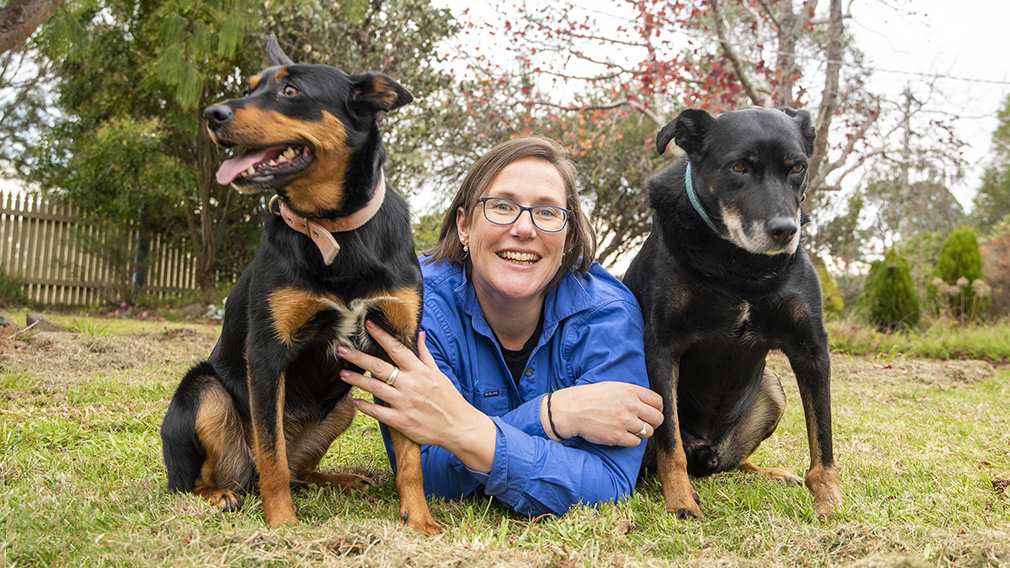
You can listen to the Campfire podcast episode “Working dogs and farmer wellbeing” with 2020 Victorian Rural Woman of the Year, Kelly Barnes, on Spotify, Apple Podcasts, and our website.
When Kelly Barnes was flicking through the stream of ‘dog selfies’ on her phone, she had an idea that would alter her life and the lives of so many others.
“I just thought dogs have been huge for me, I never really appreciated how much they helped me outside of doing farm work, with that support and that companionship,” Kelly told the AgVic Talk podcast.
In some ways, Kelly is running a covert operation. Her dog training school, Mates Dog School, is a professional 6-month training course, but she also sneaks in discussions with farmers about resilience, stress management, fear of failure and suicide.
“Even though we try to break down the stigma, people still don’t talk about it and I don’t think they really realise what’s going on for themselves or for someone else.”
Kelly lives in south-west Victoria and in 2020 she won the Victorian AgriFutures Rural Women of the Year Award which helped her create her working dog training program.
Throughout her own mental health struggles and diagnosis of fibromyalgia in 2015, a chronic condition which causes pain and fatigue, Kelly turned to her own dogs Dugald and Jess to get her through.
She also had also been studying mental health outcomes for people in rural communities through the National Centre for Farmer Health. That’s when combining her two passions started to make a lot of sense.
Kelly figured nearly every livestock farmer has a dog and could therefore receive the mental health benefits of spending more time with their working mate, as well as getting off farm to socialise.
“You do spend a lot of time on your own. And whether you work in a team or not, a lot of the work you do is on your own and the only thing you have with you, is your dogs.” Kelly said.
In fact, Kelly’s innovative dog training program is directly addressing several of the work-related stress factors identified by WorkSafe, such as isolation (or remote work) and low job control.
“It’s just becoming aware that there’s so many things that can affect what you’re doing that are out of your control, so it’s really giving you the tools to focus on the things you can control,” Kelly said.
“And it’s not necessarily for people with a mental illness either. It’s just giving people the tools to prevent them going down that path.”
Building connections with other farmers and the community is as much of a preventative tool as it is a supportive one.
Kelly also realised that getting farmers to open up and build trust within a group takes time – and having a practical element of dog training helps to open the line of communication.
“I couldn’t bowl in on day one, not knowing anyone, no one knows each other as well and then get everyone to start caring and sharing,” Kelly said.
“People would have run out the door 100 miles an hour,” she said.
And her unique approach to mental health, is already proving to be successful.
“The last session we did was about low stress stock-handling and you know, remaining calm.”
“I think sometimes people get so worked up when they’re working stock, and it’s all going wrong.”
“But all the participants you could see them over the course of the program, they’ve learned to accept that when things go wrong, it’s ok… you just get back in and go again.”
When it comes to running the family farm, investing in mental health initiatives is not only good for your family and staff, but it’s good for business too. The NCFH is supporting farmers just like you to manage and respond to work-related risks that impact on workplace mental health – these are factors in your work that can affect an employee’s mental health and include high job demands, low job control, low role clarity and more. Managing these factors, means decreasing the risk of work-related stress, which can prevent physical injury, mental injury or even both at the same time. Find out more about being mentally safe on the farm at www.farmerhealth.org.au/campfire.
This blog is part of the Primary Producer Knowledge Network led by the National Centre for Farmer Health to promote mentally healthy workplaces. Campfire, part of The Primary Producer Knowledge Network, is funded by the Victorian State Governments WorkSafe WorkWell Mental Health Improvement Fund.
If you’re interested in a wellbeing tool tailored to you, check out Steering Straight – it takes less than half an hour to complete.
*Primary producers featuring in this blog are fictional, but based on research interviews with farmers, and developed with the assistance of the National Centre for Farmer Health
|
|